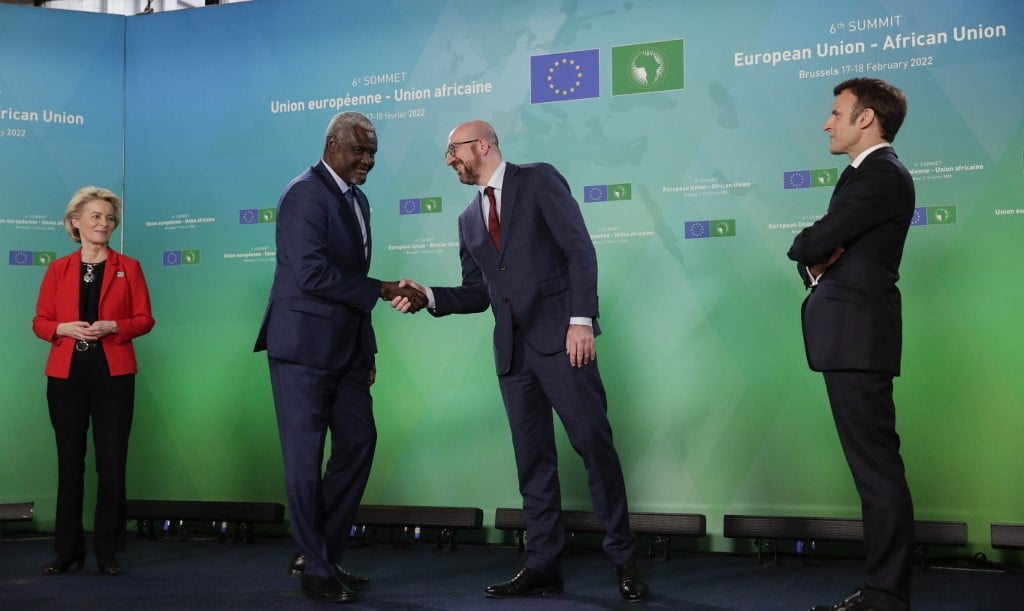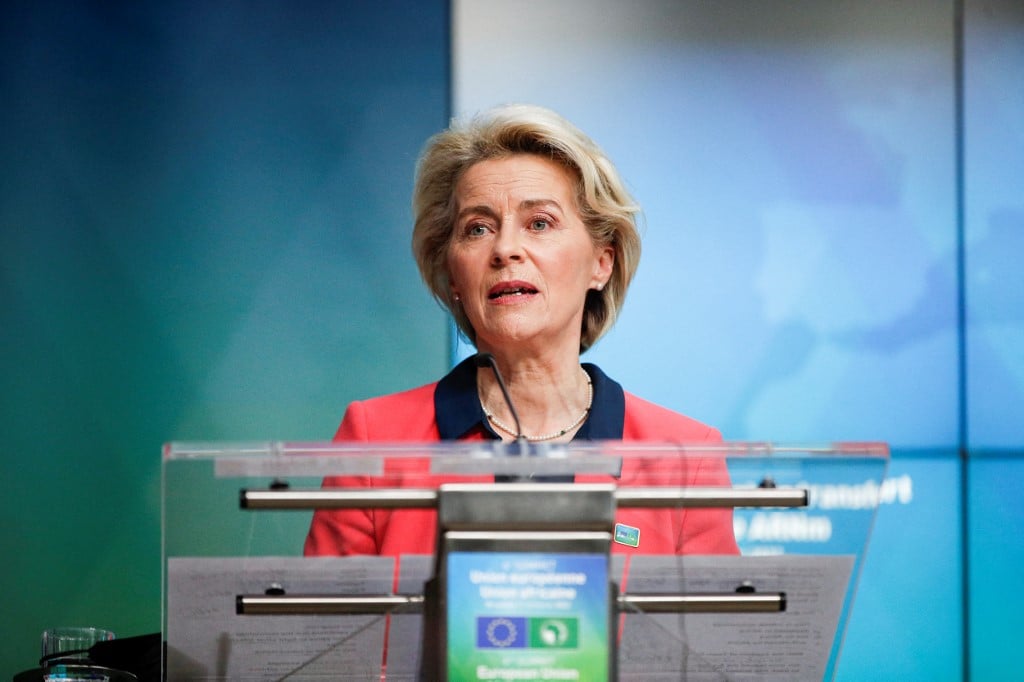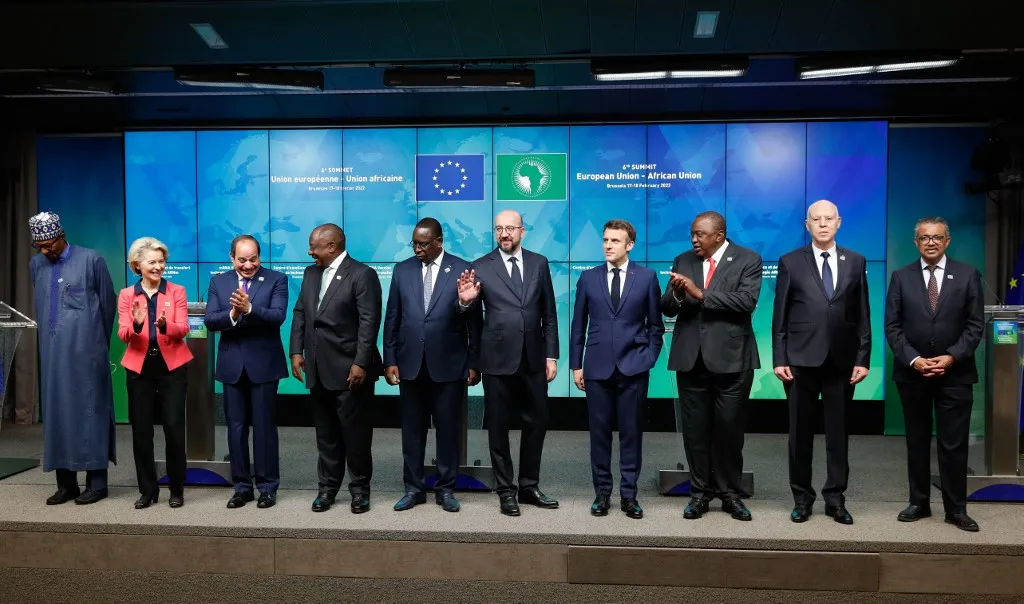The sixth summit of European Union (EU) and African Union (AU) heads of state and government concluded in Brussels on 18 February with the issuing of a “Joint Vision for 2030” that aims to consolidate a “renewed partnership” between the two continents.
“We agree that the aim of the Joint Vision is to consolidate a renewed Partnership for solidarity, security, peace and sustainable and sustained economic development and prosperity for our citizens and for our future generations, bringing together our people, regions and organisations,” says the document.
But while the document promises an investment package of €150bn for Africa over the next seven years and support for both the delivery and production of Covid-19 vaccines on the continent, it falls short on specific African demands relating to gas and fossil fuels, the waiving of intellectual property rights on Covid-19 vaccines, the reallocation of IMF special drawing rights (SDRs) and migration.
And while the €150bn sum is impressive, some commentators have questioned how much of it is new: “The figure is a projection based on a combination of grants, loans, and budget guarantees designed to spur more private investment and drawn largely from the EU’s existing 2021-2027 budget”, commented Vince Chadwick on Devex.
In this article we examine the commitments agreed in the Joint Vision and consider how far they respond to Africa’s needs.
Energy
In his speech to fellow heads of state and government on the first day of the summit, President Macky Sall of Senegal, speaking in his capacity as chair of the AU, underlined the commitment of African countries to the Paris Climate Agreement, but stressed Africa’s need to continue to develop gas as a source of energy.

“In a continent where more than 600m people live in the dark, our priority as Africans is clearly universal access to electricity and industrialisation. On this point we expect a great deal from this summit,” he said.
“The continent needs to make use of its natural resources and expects a very precise form of solidarity from Europe. That is why we are for the maintenance of financing of the gas industry and hydrocarbons for a fair and equitable energy transition that takes account of the needs of the continent.”
However, while the joint declaration recognises “that Africa’s energy transition is vital for its industrialisation and to bridge the energy gap” and “the importance of making use of available natural resources within that energy transition process”, as well as containing pledges on investing in Africa’s transition to renewable energy (see below), it falls short of recognising President Sall’s specific demand on the maintenance of financing of the gas industry and hydrocarbons.

Vaccine production
In the document, the EU reaffirms its commitment to provide at least 450m doses of Covid-19 vaccine to Africa by mid-2022. Team Europe (the EU institutions, including the European Investment. Bank, and member states) will mobilise €425m to ramp up the pace of vaccination, and in coordination with the Africa CDC, to support the efficient distribution of doses and the training of medical teams and the capacity of analysis and sequencing.
The document recognises the need to support fully-fledged health sovereignty for Africa in order to respond to future health crises. However, its commitment “to engage constructively towards an agreement on a comprehensive WTO response to the pandemic, which includes trade related, as well as intellectual property related aspects” falls short of the AU’s demand for support of a waiver of intellectual property rights on Covid-19 vaccines.
South Africa has been one of the countries leading the call for a waiver of the intellectual property rights on Covid-19 vaccines covered by the WTO’s TRIPS Agreement to help speed up vaccine production and delivery on the continent, where only 11% of the population have been vaccinated against the virus.
There has been resistance from EU and other countries who argue that transferring knowledge and ramping up manufacturing capacity would take years and therefore serve no purpose in combating the pandemic. However, the recent success of researchers in South Africa shows this is not the case, as the science journal Nature recently reported.
President Cyril Ramaphosa of South Africa, who has been outspoken in his condemnation of the “vaccine apartheid” that has seen richer countries hoard vaccines, told SABC News that some progress had been made towards a patents waiver at the summit, but that Europe had been standing in the way in order to protect the holders of those rights.
Reallocation of Special Drawing Rights
In his speech on the first day of the summit, President Sall said that Africa expected the support of Europe in achieving the reallocation of IMF special drawing rights (SDRs).
SDRs are an artificial currency issued by the IMF to member states, which can exchange them for hard currencies such as US dollars, thereby providing governments with greater liquidity. Last August the IMF issued $650bn in SDRs to help countries cope with the pressures caused by the Covid-19 pandemic. However, as SDRs are allocated by size of economy, less went to the countries that need them most, with Africa receiving only $33bn.
Africa, said President Sall, needs additional financing of $250bn by 2025 to cushion the shock of Covid-19 and aid recovery and wishes to obtain a reallocation from rich countries of $100bn of SDRs.
While the joint statement welcomes the $55bn that have been pledged already by rich countries and recognises that several EU member states have so far pledged $13bn, its statement that “[we] encourage more EU member states to consider contributing to this global effort” falls short of a firm pledge.
Investment package of at least €150bn for Africa
Speaking before the summit at a webinar organised by the Europe Africa Foundation, President Sall said: “Let’s put it bluntly: We need money – we need resources to fund the energy transition, to fund the building of facilities and infrastructures, to retain the African youth, to deliver the right training, the right education – and Europe will actually win out of this.”
The Joint Vision announces an Africa-Europe investment package of at least €150bn over the next seven years, composed of an investment, a health and an education package.
In her opening speech on the first day of the summit, European Commission president Ursula von der Leyen described how the investment would be delivered through Team Europe’s Global Gateway scheme.

“I want to talk about investment. Solid, tangible investment. I want to talk about Global Gateway,” she told the assembled heads of state and government. “Global Gateway will muster Europe’s power to unlock unprecedented levels of investment, not only public but also private capital.”
In infrastructure, the top priority will be energy, with an emphasis on the transition to renewable energy and bringing electricity to the 600m Africans without access to it. Physical and digital connectivity will also be important areas, with more roads, railways and waterways to help the African Continental Free Trade Area realise its potential, and internet connections to help Africa’s young entrepreneurs flourish.
In terms of health investment, von der Leyen emphasised that in addition to the provision and rollout of Covid vaccines, the investment would take a strategic perspective that goes beyond the pandemic.
“It is about the capacity of Africa, indeed, to produce their own vaccines, to develop mRNA manufacturing capacity across Africa,” she said.
For education, the joint declaration says that “investment will be made in inclusive and equitable quality education by improving policy and legal frameworks, access and teacher training, to contribute to safe delivery of education services and ensure learning gaps resulting from the pandemic are addressed. To this end we will promote opportunity oriented technical and professional Vocational Education and Training, including at regional level.”
Cooperation for peace and security
In his speech on the first day, President Sall said that the two continents should work together for peace and security and in the fight against terrorism, including by getting the UN Security Council to engage in action against terrorism in Africa.
The joint statement recognises existing agreements between the EU and Africa “premised on the principle of African solutions to African problems” to “to combat instability,
radicalisation, violent extremism and terrorism, tackling the root causes of conflicts, and
addressing the entire conflict cycle through the integrated approach”.

It says that together, Europe and Africa will “continue to support African-led Peace Support Operations and the on-going discussions on the use of UN-assessed contributions for operations authorised by the UN Security Council, and the implementation of the AU human rights compliance framework in that context”.
It adds that there will be intensified cooperation on cybersecurity and joint efforts to “further promote the rule of law and the implementation of the Women, Peace
and Security, Children and Armed Conflict and the Youth, Peace and Security Agendas,
and underpin it with concrete actions to achieve durable peace”.
Shortly before the summit, President Emmanuel Macron of France announced the withdrawal of French troops from Mali at a joint press conference in Paris with President Sall, President Nana Akufo-Addo of Ghana and Charles Michel, president of the European Council.
France has been engaged in fighting jihadism in Mali and across the wider Sahel region since 2013, but relations with its military government have broken down.
‘An enhanced and reciprocal partnership for migration and mobility’
In his speech to the Europe Africa Foundation webinar in January, President Sall cited migration flows an important issue. The €1.8bn “trust fund” for Africa set up after the Malta Summit in 2015 partly aimed at the causes of migration was a first step, he said, “but this is still far away from the money needed by the continent. If we want young Africans to stay in Africa, we need to provide Africa with more resources.”
The joint declaration pledges to deepen cooperation on finding “durable solutions” for asylum seekers, refugees and vulnerable migrants and says that “respecting national needs, competencies and legal frameworks, pathways for legal migration opportunities will be further developed between both continents and within Africa”.
The €150bn investment commitments mentioned above, especially in the areas of education and vocational training, may go some way to providing Africa with more of the resources it needs to stemming the outflow of young Africans, but the document does not contain any specific new solutions in this area.
Did the summit really renew the relationship between Europe and Africa?
In December, as he laid out his programme for France’s six-month presidency of the EU, which began on 1 January, President Macron made it plain that relations with Africa would play an important role.
“The aim of [the EU-AU] summit is to completely overhaul the relationship because it has become – we must admit – through its instruments, bureaucratised and rather tired,” he said at a press conference in Paris, holding out the prospect of“reforging an economic and financial New Deal with Africa”.
Similarly, Rémy Rioux, the head of France’s international development agency, told our sister publication New African in an interview that he believed “a new kind of alliance will emerge, based on a different narrative and with financial resources commensurate with the crisis that has hit us, by also mobilising the private sector in Africa.”
So did the summit achieve this?
Hannah Ryder, CEO of Development Reimagined and regular contributor to African Business, commented on Africa News that the narrative of the “new deal” offered a very limited range for thinking about European engagement with African countries. European countries are looking more at competing with China in Africa than at what African countries need for development, she said.
On the question of how Europe and Africa could use the AfCFTA to make bilateral trade fairer and bigger, she pointed out that the EU has many separate economic partnership arrangements with African countries.
“The big question for the EU,” she said, “is how does it move away from a bilateral approach to a continental approach? Something like a continent-wide preferential trade arrangement would be preferable to what the EU has at the moment.”
In an article entitled “Pressing the reset button on the Europe-Africa relationship” written before the summit, Inge Kaul, senior fellow at the Hertie School in Berlin, said that the EU’s discussion document, Towards a Comprehensive Strategy with Africa, revealed an ignorance of “now long-standing, often repeated demands for a more effective voice and a partnership of equality” on the part of public and private actors in Africa.
For Kaul, the summit saw only hesitant steps towards understanding by European leaders, while African leaders remained business-like and unimpressed. “If a reset happened, then it was Africa who pressed the button – not the EU,” she told African Business.
In another entry on the same blog, Brussels-based commentator on EU affairs Shadia Islam criticised the enduringly “paternalistic” attitude of Europe towards Africa.
“If they want to make the upcoming summit different from their past attempts to reset relations, EU leaders will have to admit past failures while also correcting ongoing missteps,” she wrote, citing the return by museums of African art objects looted during the colonial era as one potential demonstration of changed European attitudes.
However, the summit’s final declaration not only failed to address President Sall’s specific demands on energy, SDRs and vaccine waivers, but also made no mention of the last big issue he raised in his speech at the opening session.
“Africa calls for the repatriation of its patrimony. The restitution of African works remains a high priority for us, because they are a part of our civilisational identity,” he told the assembled heads of state and government.
In order to build a new ethic for Europe-Africa relations based on respect and recognition of historical truth, for Africa it is essential to continue the work already begun in this area, he declared.
Summit must go beyond ‘grand declarations of intent’
Speaking to French daily Le Monde in January, leading African development economist Carlos Lopes expressed fears that the summit would produce nothing but “grand declarations of intent” by the European Commission, President Macron and even President Sall.
“Look at what happened during the pandemic: by way of aid, the European Commission simply reprogrammed funds that were already earmarked for the continent. They didn’t add a penny. And the EU did not [originally] want to encourage the lifting of patents [on vaccines] that Africans were asking for,” said Lopes.
“Europe needs to understand the direction Africa is going in with the setting up of the AfCFTA [African Continental Free Trade Area],” he told the newspaper.
When the interviewer pointed out that the EU had given great financial support for setting up the AfCFTA, Lopes responded by saying that Europe has 13 types of trade arrangements with Africa, each of which it defends firmly.
“Even if money is flowing in to finance the AfCFTA, we Africans must be more united to defend our own interests,” he declared.
Two decades of strategic partnership between Africa and Europe
Africa-EU summits have been taking place since the former Organisation of African Unity met the EU in Cairo in 2001, adopting the Cairo Declaration that recast the strategic partnership between Africa and Europe in an avowed spirit of equality, respect, alliance and cooperation.
It also set up the Africa-EU Partnership, a formal political channel through which the two continents work together.

The second summit, in Lisbon in 2007, saw the adoption of the Joint Africa-EU Strategy (JAES), which confirmed the basic objectives of the partnership and mapped out a political vision for future cooperation.
According to the AU, the summit plays an important role in moving “beyond a donor/recipient relationship towards long-term cooperation” on joint interests.
The summit usually takes place every three years, alternating between Africa and Europe, to take stock of progress in implementing commitments and to provide political guidance on further work.
The fifth summit met under the theme “Investing in youth for a sustainable future” in 2017 in Abidjan, Côte d’Ivoire. Due to the Covid-19 pandemic, the sixth summit, scheduled for November 2020, has been postponed until now.
Want to continue reading? Subscribe today.
You've read all your free articles for this month! Subscribe now to enjoy full access to our content.
Digital Monthly
£8.00 / month
Receive full unlimited access to our articles, opinions, podcasts and more.
Digital Yearly
£70.00 / year
Our best value offer - save £26 and gain access to all of our digital content for an entire year!
 Sign in with Google
Sign in with Google 



